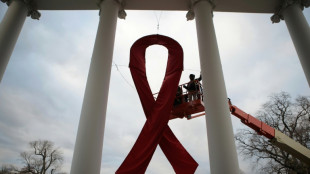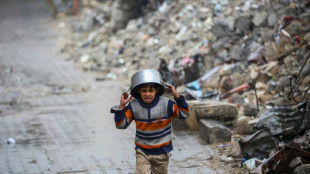
-
 Fewest new HIV cases since late 1980s: UNAIDS report
Fewest new HIV cases since late 1980s: UNAIDS report
-
4 security forces killed as ex-PM Khan supporters flood Pakistan capital

-
 Four bodies, four survivors recovered from Egypt Red Sea sinking: governor
Four bodies, four survivors recovered from Egypt Red Sea sinking: governor
-
Ayub century helps Pakistan crush Zimbabwe, level series

-
 French court cracks down on Corsican language use in local assembly
French court cracks down on Corsican language use in local assembly
-
Prosecutors seek up to 14-year terms for French rape trial defendants

-
 Russia expels UK diplomat accused of espionage
Russia expels UK diplomat accused of espionage
-
Israeli security cabinet to discuss ceasefire as US says deal 'close'

-
 COP29 president blames rich countries for 'imperfect' deal
COP29 president blames rich countries for 'imperfect' deal
-
Stocks retreat, dollar mixed on Trump tariff warning

-
 No regrets: Merkel looks back at refugee crisis, Russia ties
No regrets: Merkel looks back at refugee crisis, Russia ties
-
IPL history-maker, 13, who 'came on Earth to play cricket'

-
 Ukraine says Russia using landmines to carry out 'genocidal activities'
Ukraine says Russia using landmines to carry out 'genocidal activities'
-
Prosecutors seek up to 12-year terms for French rape trial defendants

-
 'Record' drone barrage pummels Ukraine as missile tensions seethe
'Record' drone barrage pummels Ukraine as missile tensions seethe
-
Laos hostel staff detained after backpackers' deaths

-
 Hong Kong LGBTQ advocate wins posthumous legal victory
Hong Kong LGBTQ advocate wins posthumous legal victory
-
Ukraine says cannot meet landmine destruction pledge due to Russia invasion

-
 Rod Stewart to play Glastonbury legends slot
Rod Stewart to play Glastonbury legends slot
-
Winter rains pile misery on war-torn Gaza's displaced

-
 'Taiwan also has baseball': jubilant fans celebrate historic win
'Taiwan also has baseball': jubilant fans celebrate historic win
-
Russia pummels Ukraine with 'record' drone barrage

-
 Paul Pogba blackmail trial set to open in Paris
Paul Pogba blackmail trial set to open in Paris
-
China's Huawei unveils 'milestone' smartphone with homegrown OS

-
 Landmine victims gather to protest US decision to supply Ukraine
Landmine victims gather to protest US decision to supply Ukraine
-
Indian rival royal factions clash outside palace

-
 Equity markets retreat, dollar gains as Trump fires tariff warning
Equity markets retreat, dollar gains as Trump fires tariff warning
-
Manga adaptation 'Drops of God' nets International Emmy Award

-
 China's Huawei launches 'milestone' smartphone with homegrown OS
China's Huawei launches 'milestone' smartphone with homegrown OS
-
Philippine VP denies assassination plot against Marcos

-
 Four Pakistan security forces killed as ex-PM Khan supporters flood capital
Four Pakistan security forces killed as ex-PM Khan supporters flood capital
-
Hong Kong's legal battles over LGBTQ rights: key dates

-
 US lawmakers warn Hong Kong becoming financial crime hub
US lawmakers warn Hong Kong becoming financial crime hub
-
Compressed natural gas vehicles gain slow momentum in Nigeria

-
 As Arctic climate warms, even Santa runs short of snow
As Arctic climate warms, even Santa runs short of snow
-
Plastic pollution talks: the key sticking points

-
 Indonesia rejects Apple's $100 million investment offer
Indonesia rejects Apple's $100 million investment offer
-
Pakistan police fire tear gas, rubber bullets at ex-PM Khan supporters

-
 Ronaldo double takes Al Nassr to brink of AFC Champions League last 16
Ronaldo double takes Al Nassr to brink of AFC Champions League last 16
-
Pakistan police fire tear gas, rubber bullets at pro-Khan supporters

-
 Hong Kong same-sex couples win housing, inheritance rights
Hong Kong same-sex couples win housing, inheritance rights
-
Indonesia digs out as flooding, landslide death toll hits 20

-
 Liverpool's old guard thriving despite uncertain futures
Liverpool's old guard thriving despite uncertain futures
-
Mbappe takes reins for Real Madrid in Liverpool clash

-
 As AI gets real, slow and steady wins the race
As AI gets real, slow and steady wins the race
-
China's Huawei to launch 'milestone' smartphone with homegrown OS

-
 Porzingis and Morant make triumphant NBA returns
Porzingis and Morant make triumphant NBA returns
-
Hong Kong top court affirms housing, inheritance rights for same-sex couples

-
 Philippines, China clashes trigger money-making disinformation
Philippines, China clashes trigger money-making disinformation
-
Most Asian markets drop, dollar gains as Trump fires tariff warning


From edge of extinction to Australia's croc 'paradise'
If you want a snappy death, one expert's advice is to leap into a river near the Australian city of Darwin -- within minutes, you'll be in the jaws of one of the hundreds of crocodiles that stalk its murky waters.
That's the promise of Grahame Webb, whose conservation efforts are credited with helping wrestle Australia's saltwater predators back from the verge of extinction.
"You can't sugarcoat crocs; these are seriously dangerous," Webb told AFP in his leafy garden in the country's tropical Top End.
Blunt messaging about the dangers around the waterways of Australia's north has been vital to rebuilding a population of the scaly reptiles once decimated by uncontrolled hunting, he said.
Before government protection in the 1970s, an estimated 98 per cent of the wild saltwater crocodile population had disappeared in the Northern Territory, driven by leather demand and culling.
Now, according to government figures, over 100,000 "salties", which can grow over six metres long and weigh more than 1,000 kilograms (2,200 pounds), hunt along the coasts, rivers and wetlands of the continent's far north.
- 'Eating people' -
"It's been a raging success story," Webb said.
But protecting the animals was only a first step.
"To conserve predators, you've got to rebuild their population; if you're successful at doing that, they then start eating people again, and everyone wants to get rid of them."
Charlie Manolis, a crocodile expert from the International Union for Conservation of Nature, said that by the 1980s, it was clear the community needed to see real value in the creatures to tolerate them as neighbours.
A public safety campaign, known locally as Crocwise, and regular relocations of the toothy predators from densely populated areas have helped them to coexist more peacefully with their sometimes-prey.
Wild egg harvesting is part of a "ranching" program in the Northern Territory that links the leather industry and livelihoods directly to the animals, according to colleagues Webb and Manolis.
Under the scheme, landholders -- many of them Indigenous Australians -- can receive payments for wild eggs collected from their properties, which are then supplied to ranches.
The lucrative leather trade relies on farms primarily stocked with eggs and animals plucked from the wild, with 70,000 eggs and 1,400 crocodiles allowed to be taken each year.
"There are quite a lot of people who are employed through crocodiles," Webb said, highlighting both tourism and farming industries.
- 'Cattle eater' -
The crocodile farming industry has been estimated to be worth over Aus$100 million (US$66 million) a year to the Territory, which is the largest producer of skins in Australia. The resulting leather is highly prized by luxury brands such as Hermes and Louis Vuitton.
Manolis said that although some people are critical of the management strategy for "using" animals and removing them from the wild, the connection to an industry has helped save the species from mass culls.
"It's not about farming, per se. Farming is what we used to make sure the wild population is conserved," he said.
"I was in mining, then I was a mother, and now I'm a croc keeper," Jess Grills, 32, told AFP with a smile as she manoeuvred a boat through an artificial river at Crocodylus Park near Darwin.
The park, founded by Webb, is a tourist attraction and "paradise" for "problem crocs" -- animals removed from the wild for posing a danger to locals or developing a soft spot for chomping on livestock.
"You can't train a crocodile, but you can put them in a place where they are not going to be a problem," she said as she routinely hoisted a hock of meat tethered to a long pole over the side of the boat.
She slapped the water with the bait and dangled it above.
The dark green muzzle of a once notorious "cattle-eater" called Prince slowly surfaced, followed by the glaring reptilian eyes.
The creature launched its hulking body upwards, its jaws at full stretch, before clamping its teeth deep into the flesh and splashing back into the water.
The message is clear for onlookers: be wary around where these giants hunt and live.
- 'A million years' of fear -
"You've always got to speculate that there is a crocodile in the water, no matter what," Grills said.
As populations boom and larger crocs become common, attacks, though rare, are likely to increase, Manolis said
Dealing with a fear that goes back "a million years" while keeping support for conservation will be "the biggest challenge", Manolis said.
"Let's face it, WWF (World Wildlife Fund) doesn't have a picture of a crocodile on it. It has a panda."
For Grills, the chance to admire the predators up close helps get support to save the animal.
"If you respect them and their territory, I don't think they would be as terrifying."
O.Bulka--BTB



